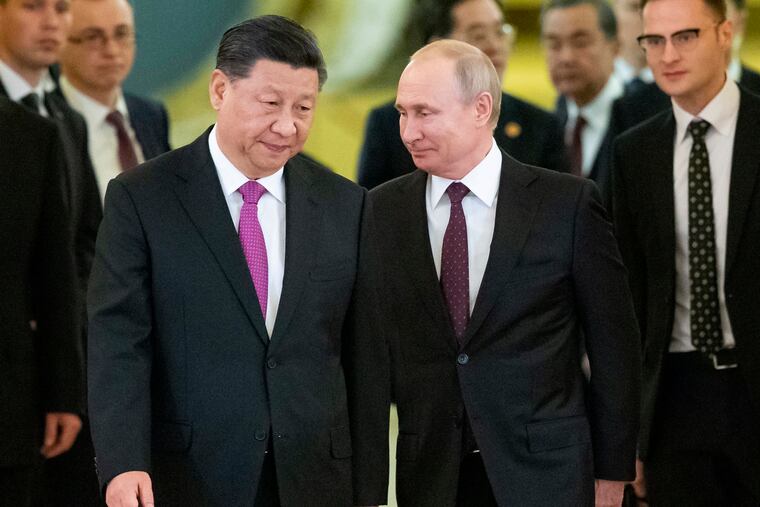It was an annus horribilis for foreign policy in 2021. Will things be better in 2022? | Trudy Rubin
Five events that helped global power shift away from the United States in 2021, and how to turn this around.

Many Americans will be glad to see this annus horribilis end, with its litany of political and personal troubles.
But looking back at U.S. foreign policy in 2021, every major global challenge that the United States has confronted fits into an unnerving pattern, that was well expressed by the chairman of the Joint Chiefs of Staff, Gen. Mark Milley, last month.
“We are witnessing one of the largest shifts in geopolitical power that the world has seen,” the general told the Aspen Security Forum. He meant, of course, China’s drive to surpass the United States in every area from economy to cutting-edge technology, to cyber capabilities and space. And then to global leadership.
Milley’s observation covers more than competition with China. In the broader sense, he meant that the world is changing faster than our leaders and our public comprehend — or than our leaders can manage. As I wrote earlier this year, science is advancing at warp speed while we humans progress at sludge speed. We saw that in 2021 with the shifting coronavirus (despite vaccine advances) and with lagging efforts to combat climate change.
» READ MORE: Top Pentagon general: "We are witnessing one of the largest power shifts..." | Trudy Rubin
When it comes to U.S. foreign policy challenges in 2021, the most critical events fit into the same pattern: they all reflect dramatic power shifts that will play out in the coming decade. Yet, their full shape is now becoming clearer, like a mirage in the desert that turns out to be real.
So let me touch on five foreign policy developments in 2021 whose impact will hit the Biden White House even harder in 2022.
The Jan. 6 insurrection. Make no mistake, America’s erratic domestic behavior — especially after four years of Donald Trump — is being watched closely by our enemies and our friends. They witnessed a defeated president provoke a domestic coup attempt and pay no price. Even though the coup failed and the Constitution prevailed, the fact that Trump continues to promote the Big Lie, backed by the bulk of the GOP, has provoked serious worry amongst our allies about 2024. America’s internal divisions have inspired more self-confidence in Beijing and more disdain for American democracy, which Chinese leaders believe is a broken system on its way down.
COVID-19, omicron, and Xi’an. In 2021, President Joe Biden got off to a fine start by vaccinating roughly half of the country — but GOP radicals along with Fox News and social media fearmongers hardened many Americans against vaccines. This has tragically prevented the United States from providing a global success model (although 61.7% are now vaxxed), even as Biden pushes a speedup in global vaccinations. Meantime, China, which still hides the origin of the coronavirus, is trying to demonstrate that its draconian model of shutdowns is the example to follow. Days ago it totally closed down Xi’an, a city of 13 million people over only 140 cases. This is not the model the world will follow, but it does impress many global leaders with its sheer authoritarian power.
The destruction of Hong Kong democracy. This fabled city just held legislative elections in which, with few exceptions, only pro-Beijing candidates were allowed to run. In 2021, Beijing has crushed most democratic elements in this city, where local elections only 18 months ago scored a huge triumph over pro-Beijing parties. China clearly feels free to arrest and/or jail nearly all pro-democracy leaders under a severe new security law, even pursuing youths whose “crime” was to demonstrate or tweet. This is yet another signal that Chinese leader Xi Jinping feels he is free to destroy domestic dissent despite constant complaints or sanctions by the West. This bodes badly for Taiwan’s future.
» READ MORE: Jan. 6 hearings lay out how Trumpers undermine America at home and abroad | Trudy Rubin
The U.S. exit from Afghanistan. No matter the desire of many Americans to end America’s “forever wars,” the chaotic U.S. exit and Taliban takeover are billed by our adversaries as proof of American weakness and unwillingness to stand by our allies. Those allies have taken keen notice, too.
Russia’s military threat against Ukraine. Vladimir Putin’s military buildup on Ukraine’s border and his effort to dictate terms to NATO indicate the Russian leader’s belief that he can split Europe back into Cold War zones where Russia dominates the east. He has put forward a draft U.S.-Russia treaty that would permit him to dominate Ukraine, as well as the Baltics, Poland, and other former Warsaw Pact states. Emboldened by his transactional alliance with China, Putin clearly believes he can strong-arm the West to play by his rules.
The events above all reflect Milley’s observations about global power shifts, in which a self-assured China and its Russian sidekick believe they can dictate terms to the West. In 2022, Biden will have the chance to push back. But that will require blocking a Russian invasion — with a tougher NATO stance before a Russian attack. It will also require strong leadership on COVID-19 at home and abroad, and a more effective counterattack against Trump’s efforts to undermine American democracy. All of which would be noticed by China.
A tough order but necessary to avoid another annus horribilis like 2021 — and to slow the power shift away from the West.